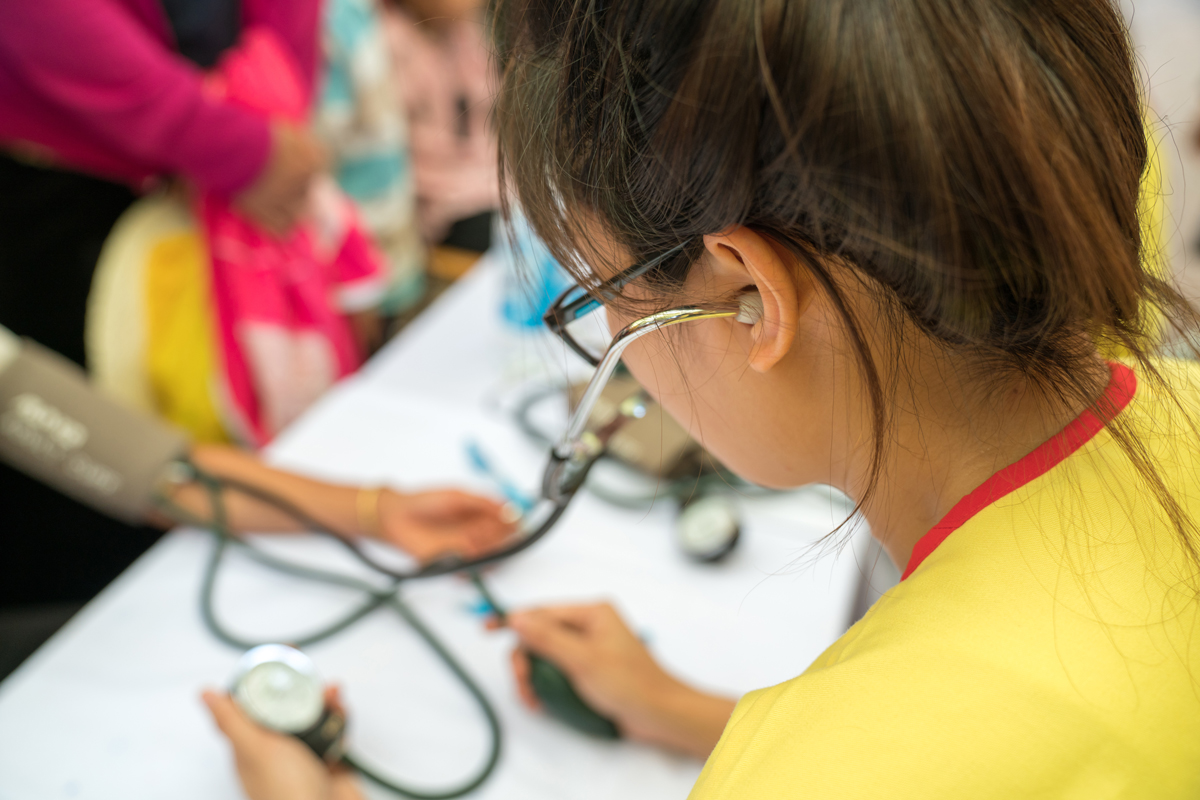
Catholic Principles for Evaluating Health Care Policy
The vital importance of providing for the health care needs of every person flows from the fact that each person bears the image of God, holds inherent human dignity, and has a God given right to life. Because of this human dignity, every person deserves to have their medical needs provided for, regardless of whether they are materially poor or rich.
In evaluating public policy as Catholics, one of the most important questions should be how specific policies impact those who are poor, sick, vulnerable, and most at risk. The obligation to care for these individuals is only possible in public policy if the foundational obligation of the human right to life is fully protected.
In the words of Pope St. John Paul II, “above all, the common outcry, which is justly made on behalf of human rights—for example, the right to health, to home, to work, to family, to culture—is false and illusory if the right to life, the most basic and fundamental right and the condition for all other personal rights, is not defended with maximum determination.”
St. John Paul II, Christifideles Laici, 38
Catholic Social Teaching applies the Gospel to various political, cultural, and social questions and provides Catholics, Christians, and all people of Goodwill with principles by which to evaluate health care policy. As a Catholic ministry, the Christ Medicus Foundation embraces this teaching and stands by these principles. Among others, the vital principles we believe Catholics should use in evaluating health care policy proposals include:
1. The Right to Life
The right to life of each human person from conception to natural death is the bedrock of all human and civil rights and must always be upheld in health care policy. Health care fundamentally is the act of caring for the life, health, and well-being of the patient and seeking the patient’s healing. Whether a patient is unborn, experiencing a chronic illness, or at the end of her or his life, all medical care, and the laws that govern this care, must respect and protect each patient’s right to life.
2. The Right to Religious Freedom and the Right of Conscience
The human and civil rights of conscience and religious freedom are vital to health care policy because these rights protect the ability of doctors, medical professionals, and patients to make decisions based on their most deeply held beliefs. Each patient must have the ability to make health care decisions based on their well-formed conscience and religious beliefs. Medical professionals must be free to make medical decisions consistent with their well-formed moral and religious convictions. Only where medical providers are free to give care consistent with their moral and religious convictions can patients receive the very best care.
3. The Dignity of the Human Person
All health care policy must respect and protect the inherent God-given dignity and value of each patient, each human person. Standards of medical care, bioethical standards, and the laws the govern the delivery of health care should be founded upon the correct understanding of the philosophical, natural, and scientific truths of the human person and should respect their inherent dignity. No patient, no matter their health status or condition, is expendable. Every patient’s life and health should be respected and protected at every stage of their life.
4. Solidarity and Subsidiarity
Bearing the Burdens of the Poor and Vulnerable and Seeking Health Care Solutions Closest to Them
Health care policy should reflect the principle of solidarity, in which civil society seeks to love, provide for, and carry the burdens of those who are sick, suffering, materially impoverished, or otherwise vulnerable. The Catholic Social Teaching principle of subsidiarity instructs that the best public policy solutions are found by going as close as possible to those who are in need. Health care policy solutions should seek to first engage the individual, the family, the local community, the Church, and local and state government because those societal resources are closest to those in need of medical care and healing. The importance of subsidiarity is reinforced by the fact that a patient’s community is one of the most important determinants of their health.
5. Patient Freedom
Patients should have true freedom to control their health care decisions consistent with the natural law. Because of each person’s right to human freedom, health care policy should always seek to respect the patient’s right to exercise control over their own medical care.
1. The Right to Life
The right to life of each human person from conception to natural death is the bedrock of all human and civil rights and must always be upheld in health care policy. Health care fundamentally is the act of caring for the life, health, and well-being of the patient and seeking the patient’s healing. Whether a patient is unborn, experiencing a chronic illness, or at the end of her or his life, all medical care, and the laws that govern this care, must respect and protect each patient’s right to life.
2. The Right to Religious Freedom and the Right of Conscience
The human and civil rights of conscience and religious freedom are vital to health care policy because these rights protect the ability of doctors, medical professionals, and patients to make decisions based on their most deeply held beliefs. Each patient must have the ability to make health care decisions based on their well-formed conscience and religious beliefs. Medical professionals must be free to make medical decisions consistent with their well-formed moral and religious convictions. Only where medical providers are free to give care consistent with their moral and religious convictions can patients receive the very best care.
3. The Dignity of the Human Person
All health care policy must respect and protect the inherent God-given dignity and value of each patient, each human person. Standards of medical care, bioethical standards, and the laws the govern the delivery of health care should be founded upon the correct understanding of the philosophical, natural, and scientific truths of the human person and should respect their inherent dignity. No patient, no matter their health status or condition, is expendable. Every patient’s life and health should be respected and protected at every stage of their life.
4. Solidarity and Subsidiarity
Bearing the Burdens of the Poor and Vulnerable and Seeking Health Care Solutions Closest to Them
Health care policy should reflect the principle of solidarity, in which civil society seeks to love, provide for, and carry the burdens of those who are sick, suffering, materially impoverished, or otherwise vulnerable. The Catholic Social Teaching principle of subsidiarity instructs that the best public policy solutions are found by going as close as possible to those who are in need. Health care policy solutions should seek to first engage the individual, the family, the local community, the Church, and local and state government because those societal resources are closest to those in need of medical care and healing. The importance of subsidiarity is reinforced by the fact that a patient’s community is one of the most important determinants of their health.
5. Patient Freedom
Patients should have true freedom to control their health care decisions consistent with the natural law. Because of each person’s right to human freedom, health care policy should always seek to respect the patient’s right to exercise control over their own medical care.
Support the Mission

We need your help over the next 24 months and beyond to fully launch the religious freedom campaign to defend religious liberty and protect Christ-centered Catholic health care. Your support is powerful in helping us share this critical message.
Ignite the Mission

Be the flame that ignites a fire within the greater Catholic community. Join our grassroots education and awareness efforts to advance religious freedom and build authentically Catholic healthcare. Click below to get involved!





